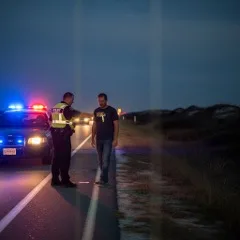Legal Advocacy
DWI Laws in NC
 North Carolina’s impaired driving law is N.C.G.S. 20-138.1. The statute defines the offense as impaired driving, and it criminalizes driving a vehicle on a highway, street, or public vehicular area while under the influence of an impairing substance, after consuming enough alcohol to reach a 0.08 alcohol concentration at a relevant time after driving, or with any amount of a Schedule I controlled substance or its metabolites in blood or urine.
North Carolina’s impaired driving law is N.C.G.S. 20-138.1. The statute defines the offense as impaired driving, and it criminalizes driving a vehicle on a highway, street, or public vehicular area while under the influence of an impairing substance, after consuming enough alcohol to reach a 0.08 alcohol concentration at a relevant time after driving, or with any amount of a Schedule I controlled substance or its metabolites in blood or urine.
While the general public, prosecutors, and defense lawyers use terms like DWI, DUI, or drunk driving in everyday conversation to describe the offense of impaired driving, those labels do not appear in the statute and they do not describe separate crimes under North Carolina law.
What the State Must Prove in an Impaired Driving CaseImpaired driving in North Carolina is defined by specific statutory elements that the State must prove beyond a reasonable doubt.
Who Qualifies as a Driver or OperatorA driver is someone who is in actual physical control of a vehicle. That control may exist even when a vehicle is not moving. A vehicle that is running or capable of being placed in motion may satisfy this element, which is why impaired driving charges on the Outer Banks (OBX) can arise in parked vehicles, beach access points, or pull-off areas.
What Counts as a Vehicle Under North Carolina LawA vehicle includes any device by which a person or property may be transported upon a highway or other street, roadway or “public vehicular area.” For impaired driving purposes, the definition is broader than some expect. It may include bicycles and lawnmowers, while excluding horses and certain electric personal assistive mobility devices. Whether something qualifies as a vehicle under the NC DWI law depends on the statutory definition and the facts of the case.
Where Impaired Driving Can OccurImpaired driving does not have to occur on a traditional roadway. The statute applies to highways, streets, and public vehicular areas. A highway or street includes the full width of any way open to the public for vehicular traffic as a matter of right. A public vehicular area includes locations that function as roadways even if they are not formally classified as streets or highways, like parking lots of stores, restaurants, and even private communities and neighborhoods on the Outer Banks.
Public Vehicular Areas on the Outer BanksOn the Outer Banks, public vehicular areas frequently include beach driving areas, parking lots, roads within or leading to subdivisions, private property open to the public for vehicular traffic, school and university grounds, business premises, federal property, and similar locations. impaired driving charges regularly take place where some incorrectly assume are private but that qualify as public vehicular areas under North Carolina law.
How North Carolina Impaired Driving Cases Are EvaluatedIssue | How North Carolina Law Treats It |
What is the criminal charge? | The offense is impaired driving under N.C.G.S. 20-138.1. Terms such as DWI or DUI are informal labels and do not describe separate crimes. |
Where impaired driving can occur | Impaired driving may occur on highways, streets, and public vehicular areas, including parking lots, beach access roads, subdivision roads, and other locations open to public vehicular traffic. |
How impairment may be proven | The State may proceed under appreciable impairment, an alcohol concentration of 0.08 or higher at a relevant time after driving, or the presence of a Schedule I controlled substance or its metabolites. |
Role of chemical testing | Breath or blood testing may be used to measure alcohol concentration or detect substances, subject to statutory and regulatory requirements, and evaluated alongside other evidence. |
Civil license consequences | A thirty-day civil revocation may apply based on qualifying test results, willful refusal of chemical testing, or any alcohol detected in a driver under twenty-one, separate from the criminal case. |
Who decides guilt and punishment | Judges decide admissibility issues and impose sentences after conviction. Juries decide guilt and weigh evidence when a case is tried to a jury. |
What Impairment Means Under the North Carolina DUI/DWI Law
Impairment under North Carolina law can be proven through more than one statutory theory. The State may allege that a defendant was under the influence of an impairing substance, or that the defendant consumed sufficient alcohol to reach an alcohol concentration of 0.08 at a relevant time after driving. In those situations, the focus is on whether alcohol or another substance appreciably impaired physical or mental faculties.
North Carolina law also recognizes a separate statutory basis for impaired driving involving Schedule I controlled substances. Under that provision, the State may proceed by alleging that the defendant drove with any amount of a Schedule I controlled substance, or its metabolites, present in blood or urine. Schedule I substances are defined by statute and include drugs that the General Assembly has classified as having no accepted medical use under state law. This theory does not require proof of appreciable impairment in the same manner as alcohol-based cases.
An impairing substance may include alcohol, illegal drugs, lawfully prescribed medications, over-the-counter medications, or combinations of substances. Being under the influence means that a person’s physical or mental faculties were appreciably impaired, affecting the ability to operate a vehicle safely. Which statutory theory applies, and what the State must prove, depends on the impairing substance or substances alleged and the evidence presented in the case.
Alcohol, Drugs, and Chemical Testing Alcohol concentration is measured through breath or blood testing. Urine testing, while technically approved to determine BAC - Blood Alcohol Concentration, that is unheard of in North Carolina DWI/DUI prosecutions. Chemical analyses are governed by North Carolina statutes and administrative rules that prescribe how testing is requested, conducted, and documented. Refusing a properly requested chemical breath test (known as a Willful Refusal) carries potential separate civil consequences and may result in a one-year revocation of the privilege to drive in North Carolina, with limited eligibility for a limited driving privilege with substantial conditions precedent.
Alcohol concentration is measured through breath or blood testing. Urine testing, while technically approved to determine BAC - Blood Alcohol Concentration, that is unheard of in North Carolina DWI/DUI prosecutions. Chemical analyses are governed by North Carolina statutes and administrative rules that prescribe how testing is requested, conducted, and documented. Refusing a properly requested chemical breath test (known as a Willful Refusal) carries potential separate civil consequences and may result in a one-year revocation of the privilege to drive in North Carolina, with limited eligibility for a limited driving privilege with substantial conditions precedent.
North Carolina’s implied consent laws authorize a thirty-day civil revocation, also known as a “CVR,” of driving privileges when specific statutory conditions are met. A civil revocation applies if a chemical analysis reports an alcohol concentration of 0.08 or higher, if a driver willfully refuses a properly requested chemical breath or blood test, or if a driver under the age of twenty-one has a BAC - Blood Alcohol Concentration any amount of alcohol.
A civil revocation related to impaired driving is administrative and separate from the criminal case. It takes effect immediately once a qualifying condition exists and does not depend on whether the driver is later convicted.
Pretrial Limited Driving Privileges During a Civil RevocationDuring the thirty-day civil revocation period, some drivers may qualify for a pretrial limited driving privilege beginning on day eleven. Eligibility depends on statutory criteria, timing, and completion of required steps. If granted, the privilege may allow restricted driving for specific purposes while the civil revocation remains in effect. Some people refer to a PreTrial Limited Driving Privilege as a “work license,” “hardship license,” “paper license,” or "Cinderella license.”
License Reinstatement After a Civil RevocationOnce the thirty-day civil revocation period ends, the civil revocation fee of one hundred dollars must be paid before the Division of Motor Vehicles may restore driving privileges. Payment of that fee is processed through the Clerk of Superior Court, but the Clerk does not reinstate a license. Reinstatement, if it occurs, is handled by the North Carolina DMV.
Payment of the civil revocation fee does not resolve other license issues. If a driver’s license is otherwise revoked, suspended, expired, or subject to a separate DMV action, paying the civil revocation fee does not cure those conditions. Payment of the one hundred dollar civil revocation fee does not reinstate a driver’s license by itself. The fee is processed through the Clerk of Superior Court, but any restoration of driving privileges, if it occurs, is handled by the North Carolina Division of Motor Vehicles. Payment of the fee does not resolve other license issues such as a suspension, revocation, or expiration that may already exist.
Payment of the civil revocation fee is required before a post-conviction limited driving privilege may be considered by the court. A pretrial limited driving privilege during the civil revocation period is governed by separate statutory requirements and is not conditioned on payment of the civil revocation fee. Whether driving privileges are restored after the civil revocation period depends on the driver’s DMV status and on how the impaired driving charge and any related license consequences are ultimately resolved.
Burden of Proof and Legal ProtectionsIn an impaired driving prosecution, the State must prove guilt beyond a reasonable doubt before a conviction, entry of judgment and punishment may be imposed. That burden applies to every element of the offense. Whether law enforcement complied with statutory requirements and constitutional protections during the stop, arrest, and testing process can affect what evidence may be considered by the trial court in assessing a motion to suppress, motion to dismiss, motions challenging reasonable suspicion and probable cause to arrest.
Errors during an investigation or prosecution can matter in concrete ways. Failures to follow implied consent procedures, violations of constitutional rights, or defects in how evidence is gathered, preserved, or presented may justify suppression of evidence, and possible dismissal of charges. Each case is different and unique. To discuss the specifics of your legal matter, consult legal counsel. Issues such as improper restrictions on pretrial release or access to witnesses during the investigation phase may also have legal significance under North Carolina law.
Traffic Stops, Screening Tests, and ArrestsBefore law enforcement may stop a vehicle, the officer must have reasonable, articulable suspicion that a traffic violation or criminal offense has occurred. The basis for the stop can matter because it may, in appropriate fact patterns, control what follows and whether later evidence may be challenged.
Before an officer may request a roadside alcohol screening test, additional legal thresholds apply. The officer must have reasonable grounds to believe that the driver committed an implied consent offense, consumed alcohol and committed a moving violation, or was involved in a crash. A roadside screening device, such as an AlcoSensor PBT hand-held breath test, is an investigative tool used to assist in determining probable cause. The results of a roadside screening test are not admitted at trial as substantive evidence of impairment. Put simply, the PBT reading (the numerical value) is not admissible as evidence in court.
An arrest for impaired driving requires probable cause. Law enforcement may refer to that as the “arrest decision.” Once a defendant is taken into custody and if subjected to interrogation, Miranda protections may apply. Statements obtained without proper advisement of Fifth Amendment rights, or in violation of other constitutional safeguards, may be subject to suppression and may not be used against the defendant in court.
Evaluating Chemical Test EvidenceChemical testing to determine BAC - Blood Alcohol Concentration )or the existence of impairing substances) does not necessarily end the legal analysis. How testing was requested, conducted, and documented can affect how test results are evaluated and how they are presented to the Court (the presiding Judge).
Certain technical and legal issues related to chemical testing can raise questions of admissibility that are decided by the presiding judge before the evidence is presented at trial as substantive evidence of impairment.
In some cases, expert testimony may help the Court and juries understand the limits of chemical testing, the assumptions built into the testing process, and how those factors relate to the evidence offered by the State.
Other factors can bear on the weight of the evidence rather than admissibility. Expert testimony, including testimony from a Drug Recognition Expert (DRE), may be offered to explain testing methods, physiological assumptions, and conclusions drawn from observations or test results. That testimony can affect whether the State has carried its burden of proof beyond a reasonable doubt on the question of impairment.
In cases tried before a jury, chemical test evidence and Drug Recognition Expert testimony are considered along with all other evidence. The jury decides what weight to give that evidence, if any, in determining whether the State has proven impaired driving under the applicable legal standard.
Sentencing and Punishment for Impaired Driving If a conviction occurs, punishment is determined at a sentencing hearing and depends on a defendant’s prior impaired driving history and the presence of statutory sentencing factors. North Carolina law requires the Court to consider, upon proper admission, grossly aggravating, aggravating, and mitigating factors.
If a conviction occurs, punishment is determined at a sentencing hearing and depends on a defendant’s prior impaired driving history and the presence of statutory sentencing factors. North Carolina law requires the Court to consider, upon proper admission, grossly aggravating, aggravating, and mitigating factors.
The State carries the burden of proof, beyond a reasonable doubt, for statutory aggravating and grossly aggravating factors in North Carolina impaired driving cases. The defendant, through legal counsel, carries the burden of proof by a preponderance of the evidence for any mitigating factors, sometimes referred to as factors in mitigation.
When a prior impaired driving conviction falls within the applicable statutory look-back period, or when another grossly aggravating factor is present, active jail time is required by statute. In appropriate circumstances, the Court may award credit against an active sentence for time spent as an inpatient at a facility operated or licensed by the State for the treatment of alcoholism or substance abuse, if the statutory requirements are satisfied. The law also authorizes continuous alcohol monitoring, including SCRAM-style monitoring, as part of probationary conditions in qualifying cases, and it permits limited credit for pretrial monitoring toward probation monitoring requirements in certain sentencing levels.
The presiding judge, rather than a jury, determines the specific sentence within the statutory range based on the evidence presented at sentencing.
When no grossly aggravating factors apply, the Court balances aggravating and mitigating factors to determine punishment. In those cases, sentencing exposure may include active jail time (when appropriate), fines, probationary conditions, and other statutory consequences, subject to the Court’s discretion.
Grossly Aggravating FactorsA prior conviction for an offense involving impaired driving if the conviction occurred within seven years before the date of the offense being sentenced, occurred after the date of the offense but before or contemporaneously with sentencing, or was appealed from district court to superior court and later remanded without a new sentencing hearing under G.S. 20-38.7.
Each prior conviction counts separately.
- Driving while the defendant’s license was revoked for impaired driving under G.S. 20-28.2.
- Serious injury to another person caused by the impaired driving.
- Driving while a child under eighteen, a person with the mental development of a child under eighteen, or a person with a physical disability preventing unaided exit from the vehicle was present.
- Gross impairment of faculties or an alcohol concentration of 0.15 or more.
- Especially reckless or dangerous driving.
- Negligent driving leading to a reportable accident.
- Driving while license revoked.
- Two or more prior motor vehicle convictions carrying three or more points within five years, or a prior impaired driving conviction more than seven years old.
- Speeding to elude arrest.
- Speeding thirty miles per hour or more over the limit.
- Passing a stopped school bus.
- Any other factor increasing the seriousness of the offense.
- Slight impairment from alcohol with an alcohol concentration not exceeding 0.09.
- Slight impairment from alcohol without chemical analysis.
- Safe and lawful driving apart from impairment.
- A safe driving record with no qualifying convictions within five years.
- Impairment primarily caused by a lawfully prescribed drug taken within prescribed dosage.
- Voluntary mental health assessment and participation in recommended treatment.
- Completion of a substance abuse assessment, compliance with recommendations, and sixty days of continuous abstinence verified by approved monitoring.
- Any other factor reducing the seriousness of the offense.
A conviction for impaired driving results in mandatory license revocation. Revocation periods increase with prior impaired driving history and may reach permanent revocation in repeat cases.
Limited Driving Privileges After ConvictionAfter conviction, limited driving privileges may be available in certain circumstances, including under Level 2 sentencing provisions. Eligibility depends on statutory criteria, prior impaired driving history, and satisfaction of required conditions, and the decision to grant a limited driving privilege rests with the presiding judge. Any limited driving privilege is narrowly defined by statute, and violations can result in additional criminal charges and further license consequences.
Vehicle Seizure and Impoundment in Impaired Driving CasesWhen a defendant is charged with impaired driving at a time when their driver’s license is revoked as the result of a prior impaired driving revocation, the vehicle involved may be subject to seizure and impoundment under North Carolina law.
Whether the vehicle is ultimately forfeited depends on statutory requirements, ownership interests, and the outcome of the criminal case.
Permanent forfeiture may occur after conviction in qualifying cases, but it is not automatic and is subject to procedural protections and judicial review.
Vehicle Release for Non-Defendant OwnersWhen someone other than the defendant owns the vehicle, the owner or lienholder may seek pretrial release through the Clerk of Court. Bonding requirements, storage costs, and procedural rules apply, and final disposition may depend on how the criminal case is resolved.
Alcohol Assessments and Sentencing ConsiderationsUnder North Carolina law, a substance abuse assessment is a statutory prerequisite for both a pretrial limited driving privilege and a post-conviction limited driving privilege.
The point of the assessment is to have a qualified provider evaluate alcohol or substance use under state guidelines and generate a formal written recommendation, which can range from no services to education classes to treatment.
The assessment must be completed in accordance with state requirements and supported by proper documentation before the Court may issuing a limited driving privilege.
What follows from the assessment is not the same thing as the assessment itself.
Education or treatment is typically recommended based on the assessment results, At sentencing, the Court (the Judge) may consider evidence that a defendant completed an assessment and addressed any recommended education or treatment.
OBX Impaired Driving | Frequently Asked Questions North Carolina law does not create separate DUI and DWI crimes. The criminal offense is impaired driving under N.C.G.S. 20-138.1. Terms like DWI, DUI, and drunk driving are used in conversation by police, lawyers, courts, and the public, but they all refer to the same statutory offense of impaired driving. What matters legally is whether the State can prove impaired driving under one of the theories recognized by the statute, not which label is used.
North Carolina law does not create separate DUI and DWI crimes. The criminal offense is impaired driving under N.C.G.S. 20-138.1. Terms like DWI, DUI, and drunk driving are used in conversation by police, lawyers, courts, and the public, but they all refer to the same statutory offense of impaired driving. What matters legally is whether the State can prove impaired driving under one of the theories recognized by the statute, not which label is used.
Impaired driving charges do not require proof that a vehicle was moving. North Carolina law focuses on actual physical control of a vehicle. That can include situations where a vehicle is running or capable of being placed in motion, even if it is parked. On the Outer Banks, parked cars, beach access points, pull-off areas, “public vehicular areas,” and parking lots are often subject to the impaired driving laws.
Impaired driving does not have to necessarily take place on a public road, street, or highway. North Carolina DUI law also applies to public vehicular areas. Public vehicular areas include locations open to public vehicular traffic such as parking lots, roads within or leading to subdivisions, beach driving areas, private property open to the public, business premises, and similar locations. On the Outer Banks, impaired driving charges frequently arise in places people sometimes incorrectly assume are private but that qualify as public vehicular areas under the statute.
Impairment can be proven through several different statutory theories in North Carolina. The State may rely on observations, driving behavior, physical indicators, chemical testing, and even expert testimony. In alcohol impairment cases, the State may proceed based on appreciable impairment or a reported alcohol concentration of 0.08 or higher. In drug-related cases, sometimes referred to as “drugged driving” or DUID - Driving Under the Influence of Drugs, the State may rely on chemical analysis, officer opinion testimony regarding appreciable impairment, Drug Recognition Expert testimony, or a combination of any of the above. Chemical test results are normally not the sole evidence in an impaired driving case, and juries are permitted to consider all admissible evidence in deciding whether the burden of proof has been met.
An impaired driving charge can trigger immediate civil license consequences that are separate from the criminal case. A thirty-day civil revocation may apply based on a reported alcohol concentration of 0.08 or higher, a willful refusal of chemical testing, or any alcohol BAC - Blood Alcohol Concentration in a driver under twenty-one. Pretrial limited driving privileges may be available in qualifying cases beginning on day eleven. After the civil revocation period ends, payment of the civil revocation fee is required before the DMV may restore driving privileges, but payment does not resolve other suspensions, revocations, or expiration issues. Long-term license consequences depend on how the criminal case is resolved and a driver’s prior record.
 Glover Law Firm Home
Glover Law Firm Home





